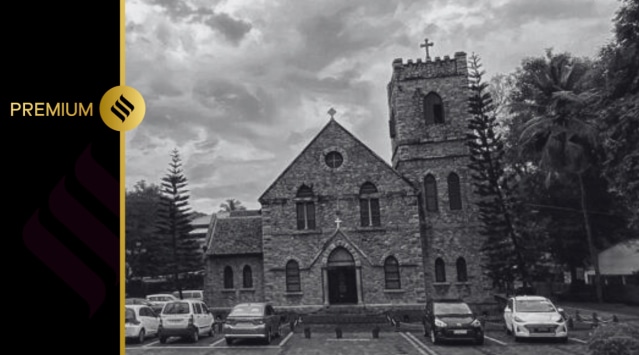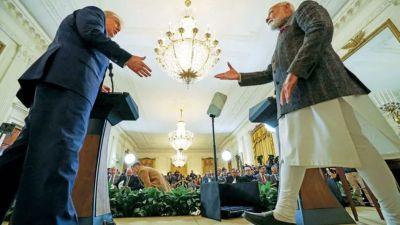Youth leaving for foreign shores, Kerala’s churches try to stem the flow
For Kerala, remittances from Malayalis living abroad have been a lifeline of the economy. The Church’s move marks a first for a major community in the state attempting to put the breaks on migration.
 Referring to the job vacancies in the state and the central governments, the bishops’ circular said: “If our children realise these opportunities and enthusiastically work hard, from school and college levels, they can emerge winners.” (Express Photo by Nandagopal Rajan)
Referring to the job vacancies in the state and the central governments, the bishops’ circular said: “If our children realise these opportunities and enthusiastically work hard, from school and college levels, they can emerge winners.” (Express Photo by Nandagopal Rajan)
Concerned over the migration of young members abroad, particularly to Europe and Canada for higher studies and employment, the Catholic Church in Kerala has launched initiatives aimed at enticing them to remain in the state.
For Kerala, remittances from Malayalis living abroad have been a lifeline of the economy. The Church’s move marks a first for a major community in the state attempting to put the breaks on migration.
Over the last two months, various dioceses of the Church have launched programmes aimed at developing an interest among the youth in government jobs, both at the state and central level. The programmes seek to ensure that the youth are equipped to take on government recruitment exams.
The Syro-Malabar Church, Kerala’s numerically dominant Christian church, has already seen a large number of its members settle in different parts of the world. It has established dioceses in the United States, Canada, Great Britain and Australia.
Last month, the Church’s dioceses of Changanassery, Pala and Kanjirappally, which have jurisdiction in central Kerala’s Christian belt that includes Kottayam and Pathanamthitta districts, jointly decided to give training to the youth for state and central government recruitment examinations.
In a joint statement, the bishops of these dioceses said the scale of migration from Kerala was creating a “social crisis”.
“Seeking a peaceful and comfortable life, our youths are migrating to foreign countries. The falling number in Kerala is a challenge to the existence of the Christian community in Kerala. The parents, who accompany the migrating youths, are also fast becoming part of alien lands. The brain-drain from Kerala and the increase in the number of houses being kept closed in the state have created a social crisis,’’ the circular said.
 Sources in the Church said that several other dioceses across the state have also individually launched such drives and training programmes aimed at getting the Catholic youth to explore government jobs. (Express Photo by Nandagopal Rajan)
Sources in the Church said that several other dioceses across the state have also individually launched such drives and training programmes aimed at getting the Catholic youth to explore government jobs. (Express Photo by Nandagopal Rajan)
Referring to the job vacancies in the state and the central governments, the bishops’ circular said: “If our children realise these opportunities and enthusiastically work hard, from school and college levels, they can emerge winners.”
Sources in the Church said that several other dioceses across the state have also individually launched such drives and training programmes aimed at getting the Catholic youth to explore government jobs.
Kerala Catholic Bishops Council (KCBC) deputy secretary general Fr Jacob Palakkappilly said the continued migration from Kerala would have far-reaching consequences.
“Our churches are missing youths. In many parishes, youths are going abroad en masse, either for higher studies or jobs. Many go on student visas and later settle abroad, leading to their families’ isolation. In many Christian families, we have only aged persons,” he said.
He also laid out the difference between the newer migrations – to Europe, Canada and other Western countries – and the more traditional practice of people from Kerala migrating to Persian Gulf countries.
“Unlike those who migrated to the Middle East, the people migrating to other parts of the world do not even send money to Kerala. This has already impacted the economy of the state. In the Church, we are facing a situation where we do find youths. With the youths taking their parents along, many houses in the state have remained locked. Farmers have pledged their land to find finances for the migration of their wards for either study or employment abroad,” he said.
 As per the Kerala Migration Survey 2018, there are around 21 lakh migrants from the state across the world. (Express Photo by Nandagopal Rajan)
As per the Kerala Migration Survey 2018, there are around 21 lakh migrants from the state across the world. (Express Photo by Nandagopal Rajan)
The Church has taken serious note of the issue, Fr Palakkappilly said. “The issue is whether we can retain the youths by prompting them to apply for jobs in the government sector. There should be enough jobs to make them take a recruitment exam and patiently wait for the result. We cannot stop migration as it has brought several accompanying benefits. The Church is serving expatriates from Kerala abroad also. But in Kerala, the presence of the Christian community in social and political spheres of life has been coming down. The Church hopes that the new initiatives to ignite interest in government jobs in the homeland will bring in change in at least a section of youths,” he said.
As per the Kerala Migration Survey 2018, there are around 21 lakh migrants from the state across the world. The state government has assigned the International Institute of Migration and Development, Kerala, for a new study.
Prof S Irudaya Rajan, chair of the International Institute of Migration and Development, said: “There is a mad rush from Kerala to foreign countries for education and employment. Earlier, it was people above the age of 25 who were going, but now we see students leaving at the age of 18,” he said.
“I don’t know whether the Church will be able to stop this flow, because this migration is not just for a job, it is a search for a new way of life and its accompanying benefits. There should be reasons that make a person return to Kerala,” he said.







